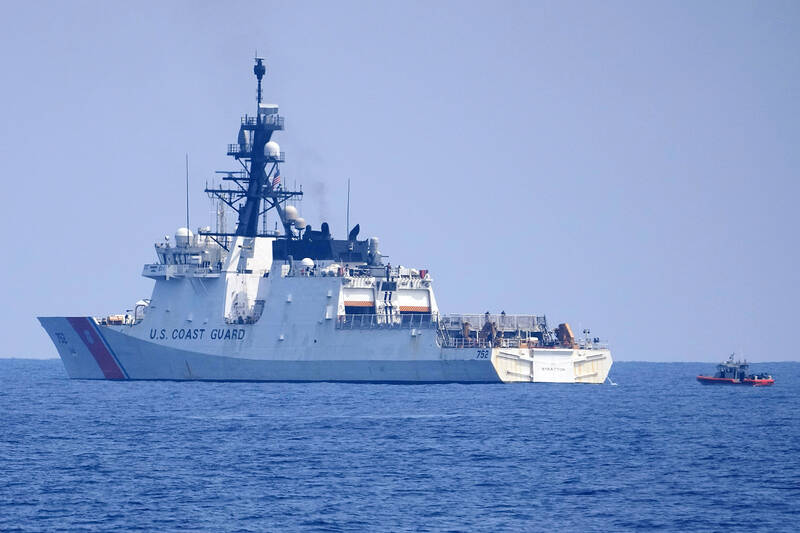A US Coast Guard ship sailed through the Taiwan Strait on Tuesday, a day after US Secretary of State Antony Blinken ended a high-profile visit to Beijing, the US Navy’s 7th Fleet said yesterday.
The national security cutter Stratton made a “routine” Taiwan Strait transit on Tuesday “through waters where high-seas freedoms of navigation and overflight apply in accordance with international law,” the fleet said in a statement.
“Stratton’s transit through the Taiwan Strait demonstrates the United States’ commitment to a free and open Indo-Pacific,” it said. “The United States military flies, sails and operates anywhere international law allows.”

Photo: AP
The mission took place the day after Blinken ended a visit to Beijing, in which the two countries agreed to stabilize their rivalry so it does not veer into conflict, but failed to produce any major breakthrough.
The Ministry of National Defense said the ship sailed in a northerly direction, and its forces monitored the situation, which it described as “normal.”
The Chinese Coast Guard described the ship’s transit as “public hype.”

Photo: screengrab from FP website
Chinese vessels tailed the US ship “all the way,” a Chinese Coast Guard spokesperson said in a statement, adding that China would “resolutely” safeguard its sovereignty, security, and maritime rights and interests.
A security source told Reuters that the US ship left the Strait in the early hours of yesterday morning.
The ministry said that on Wednesday, Chinese warships led by the Shandong aircraft carrier sailed through the Strait.
Separately, Italian patrol vessel Francesco Morosini yesterday made a stop at a US naval base in Yokosuka, Japan, in a display of Italian commitment to the Indo-Pacific region, Italian news site Le Formiche reported.
It is the first time the vessel has participated in US-led training in the region, it reported, adding that the intention is to maintain the “status quo” in the Taiwan Strait.
The Italian aircraft carrier Cavour is also scheduled to participate in exercises in the region next year.
In related news, American Institute in Taiwan Chair Laura Rosenberger yesterday said that peace and stability in the Taiwan Strait is a matter of international concern and an “orienting principle” for the US, as well as of increasing importance in Europe.
Rosenberger made the comments at a virtual dialogue entitled, “Tensions Beyond the Taiwan Strait” hosted by Foreign Policy in partnership with the Wilfried Martens Centre for European Studies.
“Peace and stability in the area are in the political, security and economic interests of the United States, and are matters of international concern,” Rosenberger said, quoting the US’ Taiwan Relations Act.
This perspective has been increasingly shared across the Atlantic and globally over the past few years, as leaders realize the critical role Taiwan plays as a “beacon of democracy” in the region and around the world, she said.
This was highlighted in the early days of the COVID-19 pandemic, when Taiwan showed how countries can harness technology to manage the pandemic in ways that align with democratic principles, she said.
These countries are realizing the critical role that Taiwan plays as a large free-market economy, Rosenberger added.
The semiconductor supply chain crunch felt during the pandemic “is something that really brought home to people the ways in which Taiwan ... plays an essential role in our technology ecosystem,” she said.
There has also been an increased understanding of the role the waters around Taiwan play in maritime shipping, and the consequences if they are threatened by China, she said.
“All of these things point to why Taiwan matters, and really raises its profile and the focus we see from many of our European partners on Taiwan,” she added.
“For so many European countries, the values agenda is really important” in their support for Taiwan, even more so since Russia’s invasion of Ukraine, Rosenberger said, adding that it is also important to understand why Taiwan matters in its own right.
Additional reporting by CNA

MAKING WAVES: China’s maritime militia could become a nontraditional threat in war, clogging up shipping lanes to prevent US or Japanese intervention, a report said About 1,900 Chinese ships flying flags of convenience and fishing vessels that participated in China’s military exercises around Taiwan last month and in January last year have been listed for monitoring, Coast Guard Administration (CGA) Deputy Director-General Hsieh Ching-chin (謝慶欽) said yesterday. Following amendments to the Commercial Port Act (商港法) and the Law of Ships (船舶法) last month, the CGA can designate possible berthing areas or deny ports of call for vessels suspected of loitering around areas where undersea cables can be accessed, Oceans Affairs Council Minister Kuan Bi-ling (管碧玲) said. The list of suspected ships, originally 300, had risen to about

DAREDEVIL: Honnold said it had always been a dream of his to climb Taipei 101, while a Netflix producer said the skyscraper was ‘a real icon of this country’ US climber Alex Honnold yesterday took on Taiwan’s tallest building, becoming the first person to scale Taipei 101 without a rope, harness or safety net. Hundreds of spectators gathered at the base of the 101-story skyscraper to watch Honnold, 40, embark on his daredevil feat, which was also broadcast live on Netflix. Dressed in a red T-shirt and yellow custom-made climbing shoes, Honnold swiftly moved up the southeast face of the glass and steel building. At one point, he stepped onto a platform midway up to wave down at fans and onlookers who were taking photos. People watching from inside

Japan’s strategic alliance with the US would collapse if Tokyo were to turn away from a conflict in Taiwan, Japanese Prime Minister Sanae Takaichi said yesterday, but distanced herself from previous comments that suggested a possible military response in such an event. Takaichi expressed her latest views on a nationally broadcast TV program late on Monday, where an opposition party leader criticized her for igniting tensions with China with the earlier remarks. Ties between Japan and China have sunk to the worst level in years after Takaichi said in November that a hypothetical Chinese attack on Taiwan could bring about a Japanese

STREAMLINED: The dedicated funding would allow the US to transfer equipment to Taiwan when needed and order upgraded replacements for stockpiles, a source said The US House of Representatives on Thursday passed a defense appropriations bill totaling US$838.7 billion, of which US$1 billion is to be allocated to reinforcing security cooperation with Taiwan and US$150 million to replace defense articles provided to the nation. These are part of the Consolidated Appropriation Act, which the US House yesterday passed with 341 votes in favor and 88 against. The act must be passed by the US Senate before Friday next week to avoid another government shutdown. The US House Committee on Appropriations on Monday unveiled the act, saying that it allocates US$1 billion for the Taiwan Security Cooperation Initiative